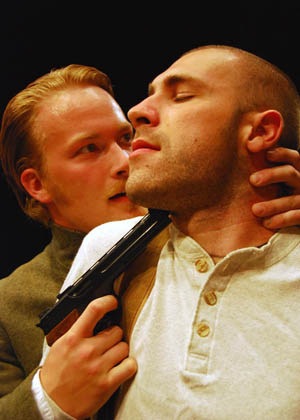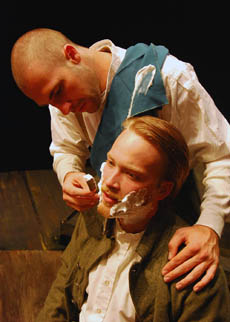B¼chner’s Woyzeck at UCSB
A Moon Like a Sword

Few plays have as tangled a history as Woyzeck, the acclaimed Late Romantic masterpiece by tragically short-lived playwright and agitator Georg B¼chner. B¼chner packed about as much literature, philosophy, and risk-taking into his 23 years as it is possible to imagine. And Woyzeck is the distillation of his precocious genius, a play that anticipates Brecht and Marx by decades while fulfilling the German Romantic quest for a drama to rival Shakespeare’s force, tension, and propulsion. The story of a peasant soldier’s growing sensitivity to the injuries of class, the play shows the collision of a young man’s precarious sense of dignity with the consequences of his mistress’s public infidelity. As B¼chner sees it, murder, madness, and possible suicide are the inevitable outcomes of a situation predetermined by a heartless society. Among the great modern tragedies of the common man, Woyzeck is the most direct and confrontational about the war between the military and medical bureaucracies and the disenfranchised individual during the early nineteenth century. I recently spoke with UCSB drama professor Tom Whitaker, the director of a new UCSB production of Woyzeck, which opens on Friday, November 9.

Is Woyzeck some kind of fragment? Yes. It was discovered in an uncompleted form, and the scenes have been done in various orders. I think of it as half of a play, and the production is the other half. The script we are using is by Gideon Lester, who translated it recently for the American Repertory Theater in Cambridge, Massachusetts. Lester takes the scenes in the same order as Mueller, whose translation is probably the most widely known and available version. It starts with Woyzeck shaving the captain, which is a great scene, and it ends when a bystander remarks that “It’s a wonderful murder, such a good one as we haven’t had for a long time.”
How ironic. Was Georg B¼chner an innovative playwright? Well, Woyzeck was at least 100 years ahead of its time. It could have been written in the 1930s, not the 1830s. It is a direct precursor to the theater of Brecht and Beckett. Like early Brecht, it has expressionistic elements, but like Shakespeare, it remains episodic.
Are you using any special theatrical devices? We will use a blackout after the murder, but otherwise it will unfold continuously, without blackouts between the scenes.
Is there a specific concept? Woyzeck is really a lot about witnessing, so I am including that in the staging by keeping all but a few of the characters onstage the entire time. They act as an onstage audience, and also as a kind of complement to the regular audience. In a similar vein, the show begins with an opening image of Woyzeck running in place while he is surrounded by society. As far as the rest of the design goes, the costumes are imagistic and pared down. The set is a disk and a platform, with scaffolding-very Brechtian.
What kinds of things were you working on in rehearsal? The real question for me as a director is always how to get real-life passion and theatrical stylization into the same moment, as part of the same frame. We have some great effects for the murder. We have incidental music by Patrick Lindley, and during the rehearsals I actually asked the cast to sing the whole thing. It came out like lyrics-B¼chner is very poetic. The cast was improvising; tri-tones and chromatics. It was quite a rehearsal.
We have a lot of the best UCSB actors in this one-Dakotah Brown, Christy Escobar, Amy Gumenick, and Brennan Kelleher. Matthew Horn will play Woyzeck, and Jessie Sherman from Angels in America will play Marie.
How is Woyzeck a play for 2007? To me, the theme of the play is that we should treat each other as human beings. The play is relevant today because there are spirals in history, and we keep spinning through them only to hit the same ground and learn the same lessons again and again. There is a lot of animal imagery in the script, and I think B¼chner meant to show that humans really are different from animals. We can have a true sense of morality. We may come from nature, but we don’t have to stay on its lowest level. It’s been called the first tragedy of the common man, and it definitely is tragic.
4•1•1
Woyzeck is at the UCSB Performing Arts Theatre November 9-11 and 13-17 at 8pm and November 11 and 17 at 2pm. For tickets and information, call 893-7221 or visit theaterdance.ucsb.edu.



